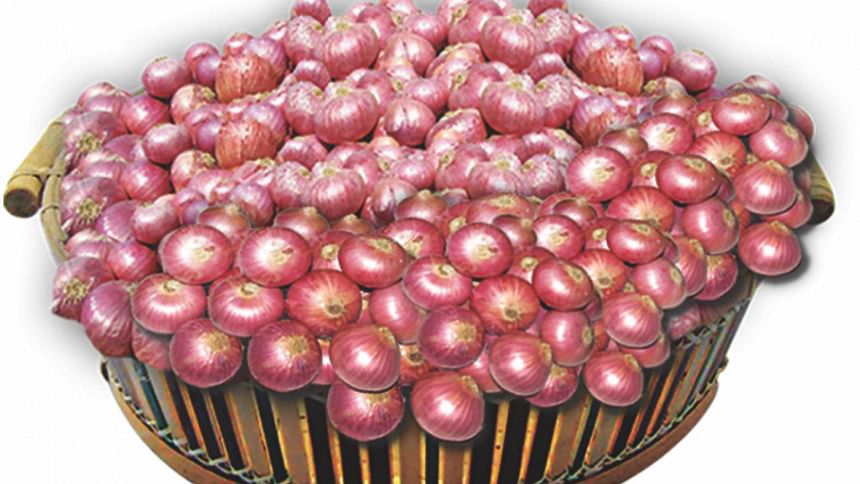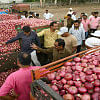Onion prices soaring

Onion prices were nearly one and a half times that of a week ago, and local traders are blaming the hike on increased prices in India, the country's main source of import.
Local variety was sold at as much as Tk 90 each kilogram in some kitchen markets of the capital yesterday, to the annoyance of people already hit hard by hiked rice price. Imported onions were sold at Tk 70 a kg.
A week ago, prices of the vegetable were in the range of Tk 48 to Tk 60 per kilogram, according to the data of Trading Corporation of Bangladesh.
The onion prices have gone up in Chittagong as well, reports our correspondent.
“When will the price hit the Tk 100 level,” an annoyed shopper asked a seller after being told the price of locally-grown onion was Tk 80 a kg at the AGB Colony kitchen market in Dhaka.
Refusing to give her name, she said she was aware of the recent price rise, but still was not expecting the onion price to be so high.
Traders blamed the price hike on high cost of import from India, the main source of onion, due to crop loss in heavy rains in the neighbouring country. The cultivation of early varieties of onion here was also affected by downpour at a time when old stocks were depleted.
Mosharaff Hossain, a trader of the kitchen market, said he had bought local and Indian onions at Tk 75 and Tk 54 a kg from Shyambazar wholesale market the day before.
“Today I came to know that local onions are being sold at Tk 80-82 per kilogram at wholesale. I am yet to increase the prices because my purchase prices were lower,” he said yesterday.
Onion is the latest item taking away a larger slice of the budget for grocery items, particularly of low income families who have already been experiencing squeezing of their purchasing capacity for high prices of rice and vegetables. Very few vegetable items are now available in the markets at below Tk 50 per kilogram.
“My income is not increasing, but prices of daily essentials are going up every day. We cannot afford the living cost,” said Md Faruk, a cobbler at Jamal Khan of Chittagong.
Asadul Islam, an onion importer at Bhomra Land Customs Station, said the recent rainfall had damaged crops that were supposed to be harvested now in Nashik, one of India's main onion producing regions.
“Growers there are selling onions from their stocks,” he said, adding that import costs, including transport and other expenses, amounted to Tk 50 per kilogram at Bhomra.
Asked about the chances of traders hoarding the food item, he said onion is a perishable commodity and one could stock imported onions only for one or two days.
Onion prices in the local markets largely depend on the prices in India, as Bangladesh does not produce enough to meet its annual requirement. Domestic production has risen in recent years though.
Between July and August, two lakh tonnes of onion have been imported. The total import in fiscal 2016-17 was 15.01 lakh tonnes, according to Bangladesh Bureau of Statistics.
Narayan Chandra Saha, a wholesaler at Shyambazar market, said prices were high in India, and the stock of locally-grown onion had almost been exhausted.
Azizul Haque, a wholesaler at Karwan Bazar, said heavy rains had affected cultivation of early varieties of onion in the main producing districts such as Pabna. “Farmers are re-growing onions now after suffering from losses.”
Mohammad Idris, proprietor of M/S Bacha Miah Saodagor, a wholesale shop at Khatunganj wholesale market, Chittagong, said onion prices had gone up in the local market due to increasing import costs.
The price of Indian onion has increased by Tk 3 a kg since Friday last, he said, adding, “As Indian onion shares almost 80 percent of the local market, the prices of onion here are determined by ups and downs of that.”
However, regulation of the retail market is necessary. The government should monitor the retail market so that retailers cannot hike the prices illogically, Md Afsar Uddin, proprietor of Sonali Traders at Khatunganj wholesale market, Chittagong, said.

 For all latest news, follow The Daily Star's Google News channel.
For all latest news, follow The Daily Star's Google News channel. 








Comments